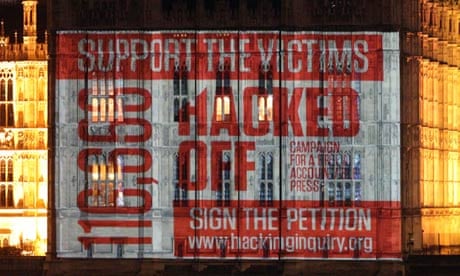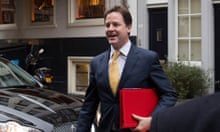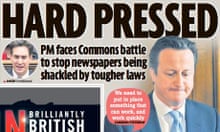David Cameron was facing a potentially damaging Commons defeat over the Leveson report after he startled his Liberal Democrat coalition partners by unilaterally announcing that he was curtailing months of talks on press regulation and would put his proposals to a vote in the Commons on Monday.
The Lib Dems and Labour, after frantic consultations, announced they would table alternative amendments to introduce an element of statute and ensure the new press regulatory body was free from industry interference – two issues that the majority of newspaper proprietors have stoutly opposed.
Ed Miliband accused the prime minister of a historic error. He said: "He has not just walked away from the talks – he has walked away from his own commitments to the press victims." An angry Nick Clegg said Cameron was wrong to turn his back on cross-party talks at this critical point. "It's not an issue which I believe should be the subject of party political point-scoring," the deputy prime minister said.
Cameron broke the news to Clegg and Miliband in a joint phone call just before 10am and then staged a lightning Downing Street press conference to justify his decision. He said his proposals provided "the fastest possible way" to deliver "the toughest press regulation that this country has ever seen".
Hacked Off, the campaign for phone-hacking victims, accused the prime minister of a "shameless betrayal of victims of press abuse". The group's lawyers had been in talks with officials from the culture department when the officials were abruptly informed by phone that Cameron had decided to end the discussions, and Hacked Off must leave the premises.
Cameron's initiative was welcomed by some of the UK's biggest newspaper groups, which said they shared his frustration at the cross-party talks being "hijacked" by advocates of legislation. The Newspaper Society, which represents some owners, said Cameron was right to reject statutory regulation as it would threaten 300 years of press freedom.
"The industry has spent many weeks in negotiating a new independent system of self-regulation, based on the Leveson principles, which provides £1m fines and the toughest system of regulation in the western world," the society said.
But in a sign that Fleet Street was no longer united in its response, the statement was not signed by representatives of the Guardian, Financial Times, Independent or Mirror Group.
After hasty discussions and lengthy wrangling over parliamentary procedure, Labour and the Lib Dems responded to Cameron by rushing to agree to table joint press reform amendments to the crime and courts bill for debate on Monday.
The amendments, to be published today, are designed to ensure that the press has no veto over the press regulatory body, places the regulator – and not the industry – in charge of the press code, and sets out details for the handling of apologies. It will also say that a reformed Press Complaints Commission should have its work overseen by a royal charter body entrenched in law, and so not open to subsequent change by future ministers.
If all Labour and Lib Dem MPs vote together they will have 313 votes, and the Conservatives 303, leaving Cameron dependent on nationalist parties to prevail. Labour sources said they were far from confident about the outcome, and admitted some rebel Tory MPs who had backed Leveson would be under ferocious pressure to support their prime minister. The Democratic Unionists, if they turn up, are likely to support a royal charter backed by statute.
Cameron's amendment to the crime and courts bill will not provide statutory underpinning for the new regulator, but will include a clause agreed by all parties to allow the courts to impose "exemplary damages" on newspapers that refuse to sign up to the system.
In a sign of exasperation at Cameron's behaviour, the Tory MP George Eustice, a supporter of Leveson, said: "There are not huge differences between the party leaders. It is just that no one has been willing to make the final small concessions required to deliver a deal that would work, and we have now run out of time." He did not disclose how he would vote.
If Cameron loses, his spokesman said he would accept the sovereignty of parliament.
Nevertheless it is open to Cameron simply to drop the bill and say the issue of press freedom should be settled at a general election. Either way his stance will strengthen his fraught relations with the rightwing press. The editors of the Daily Mail, Paul Dacre, and the Times, John Witherow, strongly oppose the use of statute in a future press regulatory system.
Tony Gallagher, the editor of the Daily Telegraph, tweeted in the immediate aftermath of the Cameron annoucement: "The PM's anger is all very well – but his lack of judgment (and foolish closeness to News Int) gave us Leveson in the first place. That said, Clegg & Mili have been disgracefully cynical, seeking to stuff #Leveson into every passing bill. No wonder PM stopped the clock." after Cameron announced on Thursday he was pulling the plug on cross-party Leveson talks
It will be only the third time the Liberal Democrats have voted with Labour in this parliament, and represents the biggest fissure between the two coalition parties since the election. Few believe the amendments being hastily assembled by Labour yesterday and due to be published today will amount to a sufficient self-standing piece of press regulation. The amendments would have to sent to the Lords for further scrutiny, and Clegg stressed yesterday he would prefer for the all-party talks to continue.








Comments (…)
Sign in or create your Guardian account to join the discussion